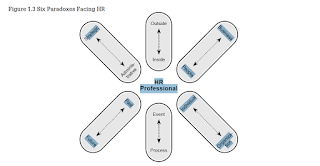Reviewing the Six Paradoxes Facing HR was very eye
opening for me. Viewing HR from the outside looking in, I was unaware of
everything that the department entails. HR is an important part of each
department within a company and can be a beneficial factor in the success of a
company. One paradox that all HR departments face is the future/past paradox.
The term paradox is related to a situation that is made up of two opposite
things and that seems impossible but is actually true or possible (Merriam Webster,
2016). The future and past paradox generates the idea that a company must
decide if their past procedures will work for the future of the company.
When companies are utilizing this concept Human
Resources must be sure that they select a balance between the two concepts. The
past can be vivid illustration to the company about what can and will work for
the company based upon past results. Generating from the past results the
company must analyze what works for the company and select the correct approach
methods for the future of the company. Both aspects are very important to the
company but can be detrimental if the company does not mix both together using
the correct methods. The HR department must adapt to the changes of the company
and the economy. When HR professionals rely on the
past for their present choices, they fail to adapt. When they ignore the past,
they relive it. When they are constantly preparing for the future, they may not
have the luxury of waiting for it. Balancing the past and the future means
learning principles from the past and then adapting those principles to future
scenarios. It also means starting with a desired future state and then shaping
present choices to create this future. To ride this paradox successfully is to
be an HR change champion who connects the past to the future and who
anticipates and manages individual, initiative, and institutional change (Younger,
J 2014).
The 5 other paradoxes are related to the past future
paradox. Each paradox requires the department to review the past in order to
generate ideas for the future. This is why this paradox is so important to the
department. Overall, I think that reviewing the past and utilizing some
procedures or concepts can be very beneficial to a company. From a HR
standpoint it is important that we transition with the needs of the company and
economy to ensure the success of the company. The past can shape the future for
many companies and we must utilize this valuable information.
Week 1 References:
Link, K., &
Müller, B. (2015). Delegating HR work to the line: Emerging tensions and
insights from a paradox perspective. Zeitschrift Für Personalforschung, 29(3/4),
280-302. doi:10.1688/ZfP-2015-03-Link
ULRICH, D., YOUNGER, J., BROCKBANK, W.,
& ULRICH, M. Next Generation HR.
Aust, I., Brandl, J.,
& Keegan, A. (2015). State-of-the-art and future directions for HRM from a
paradox perspective: Introduction to the special issue**. Zeitschrift Für
Personalforschung, 29(3), 194-213. Retrieved from http://search.proquest.com.prx-necb.lirn.net/docview/1709241796?accountid=33575
HR From The Outside In – Six
Competencies for the Future of Human Resources”; Dave Ulrich, Jon Younger,
Wayne Brockbank, Mike Ulrich; McGraw Hill
Week 1: SHRM Post
All strategies used
in Human Resources are derived from past procedures and theories related to the
situation. Individuals involved in the
department create innovative strategies that they think we take the company to
the next level and implement them. From those implementations they learn what
is successful for the company and what is not beneficial for the company. Each strategy
utilized after that is based upon past decisions. This theory can be viewed as
the past future paradox that is currently faced in HR. This theory suggests
that companies must select whether they are to use old strategies that worked
in the past for the future for a company or leave the past behind and transition
based upon the new needs of the industry and company. This paradox opened my
eyes to exactly how and why Human Resource department make certain decisions. I think that
from this research we can say that no matter what the situation is the past is
always utilized before making future decisions. This is one consistent paradox
for HR but also a beneficial paradox as well. This prevents overlooking past
issues within the company and can eliminate the risk of creating more issues
for a company.
Week 1: SHRM Reply Messages
I was very disappointed that I did not receive any feedback in SHRM discussion groups. I joined the General HR group and posted three posts. Please see attachments below.
Topic: Past Future Paradox for HR
Posted 2 days ago

No comments:
Post a Comment